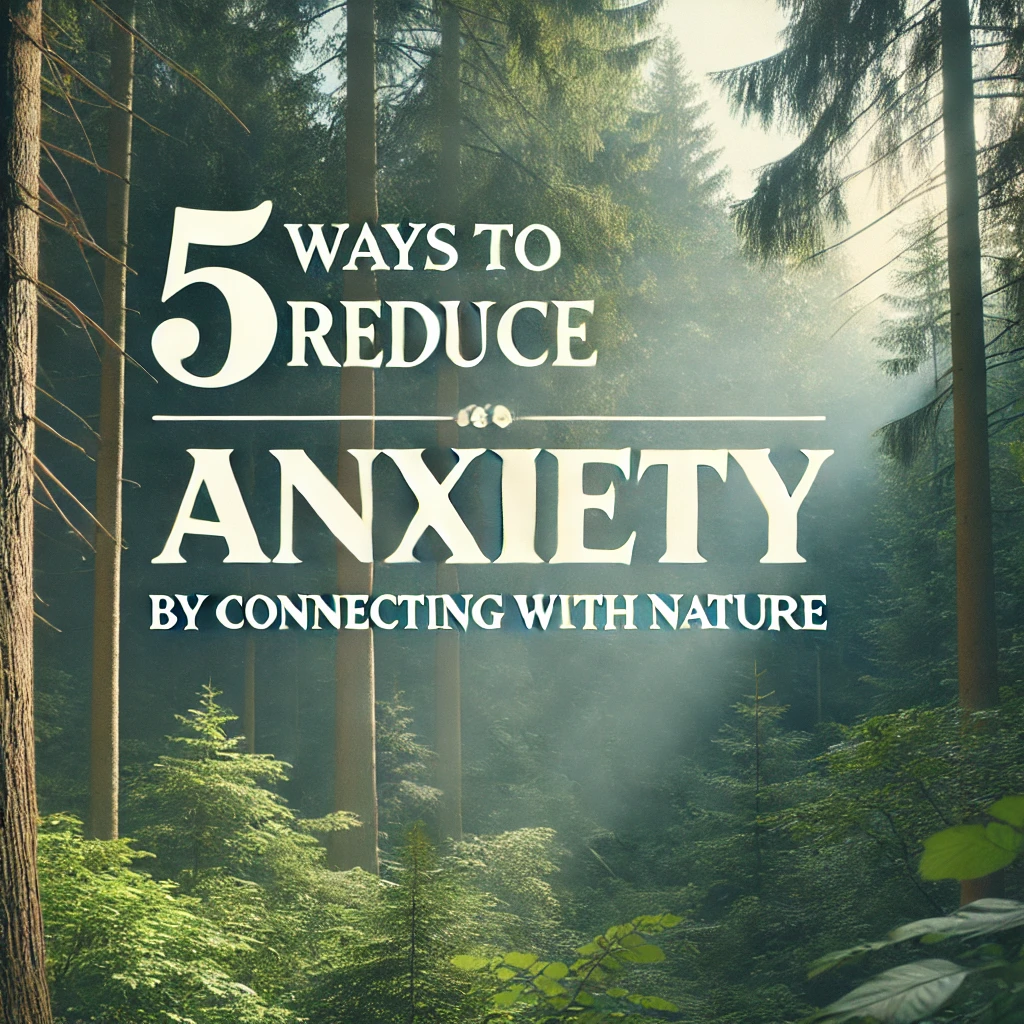Introduction:
In our tech-saturated world, anxiety is more common than ever, leaving many of us searching for natural and effective ways to find peace. Connecting with nature has been shown to provide incredible mental health benefits, and the research behind it is both fascinating and promising. Hi, it’s Romeo here, and today, I’ll guide you through five powerful ways to reduce anxiety by embracing the healing power of nature. Whether it’s a walk through the woods or practicing mindful gardening, these methods can help you find calm and clarity.

1. Practice Forest Bathing (Shinrin-Yoku)
Forest bathing, or Shinrin-Yoku, is a Japanese practice that involves immersing yourself in the sights, sounds, and smells of the forest. This is not a hike but rather a meditative experience where you slow down and connect deeply with nature.
How It Works:
- Immersion in Nature: By engaging all your senses, you allow your mind to become more present, reducing anxiety and stress.
- Scientific Evidence: A study in Environmental Health and Preventive Medicine (2010) found that participants who practiced forest bathing had lower cortisol levels, reduced heart rates, and greater feelings of relaxation.
Practical Tip: Find a local park or forest and spend at least 30 minutes walking slowly, observing the trees, feeling the ground beneath your feet, and breathing deeply.
2. Mindful Walking in Nature
Walking in nature while practicing mindfulness can significantly reduce anxiety. This practice, rooted in Buddhist traditions, encourages you to walk slowly and with full awareness of your surroundings.
How It Works:
- Grounding: Mindful walking helps anchor you in the present moment, which is essential for reducing anxious thoughts.
- Benefits: Research from Psychology Today (2015) shows that even a short 20-minute walk in a natural setting can decrease symptoms of anxiety and increase overall well-being.
Practical Tip: Choose a quiet trail or garden. Walk slowly, paying attention to your breath and the natural environment. Notice the leaves rustling, the birds chirping, and the sunlight filtering through the trees.
3. Gardening as a Stress Reliever
Gardening is a therapeutic activity that connects you directly with the earth. It’s not just about growing plants but about cultivating a sense of peace and mindfulness.
How It Works:
- Grounding Effect: The physical act of touching soil has been shown to increase serotonin levels in the brain, improving mood and reducing anxiety.
- Scientific Support: A study published in Journal of Health Psychology (2011) revealed that gardening significantly lowers cortisol and improves mood compared to indoor activities.
Practical Tip: Start a small herb or flower garden. Focus on the sensory experience: the feel of the soil, the smell of the plants, and the satisfaction of nurturing growth.
4. Water Therapy: The Calming Power of Oceans and Lakes
Being near water, whether it’s an ocean, lake, or river, can have a profoundly calming effect on the mind. This concept, known as “blue mind,” describes the meditative state triggered by water.
How It Works:
- Sound and Sight: The rhythmic sound of waves and the sight of flowing water can lower anxiety levels and promote relaxation.
- Research Insight: A study in Health & Place (2013) found that people who lived near water reported lower levels of psychological distress.
Practical Tip: Visit a local body of water and spend time observing the waves or listening to the flowing river. Practice deep breathing and let the calming environment wash away your worries.
5. Earthing: Connecting Your Body to the Earth’s Energy
Earthing, or grounding, is the practice of making physical contact with the earth, such as walking barefoot on grass or sand. This practice is believed to balance your body’s energy and reduce stress.
How It Works:
- Electromagnetic Balance: The earth’s surface is filled with negatively charged ions that can neutralize free radicals in the body, reducing inflammation and anxiety.
- Scientific Findings: A review published in Journal of Environmental and Public Health (2012) showed that earthing has calming effects on the central nervous system and helps reduce symptoms of anxiety.
Practical Tip: Spend at least 15 minutes a day walking barefoot on natural surfaces. Feel the earth beneath your feet and focus on the connection between your body and the ground.
Benefits of Connecting with Nature for Mental Health
| Method | Duration Needed | Benefit | Scientific Backing |
|---|---|---|---|
| Forest Bathing | 30 minutes | Lowers cortisol, reduces stress | Environmental Health and Preventive Medicine |
| Mindful Walking | 20 minutes | Grounds you in the present, reduces anxiety | Psychology Today |
| Gardening | 45 minutes | Increases serotonin, lowers cortisol | Journal of Health Psychology |
| Water Therapy | 30 minutes | Calms the mind, lowers psychological distress | Health & Place |
| Earthing | 15 minutes | Balances energy, reduces inflammation | Journal of Environmental and Public Health |
FAQs
1. How long does it take to feel the calming effects of nature?
Many people feel more relaxed within 15-30 minutes of spending time in nature. The effects can be immediate, especially with practices like forest bathing or earthing.
2. Can I practice these methods if I live in a city?
Yes, even urban parks or small gardens can provide significant benefits. Mindful walking and earthing can be done in any green space available to you.
3. How often should I connect with nature to reduce anxiety?
Aim to connect with nature at least 3-4 times a week. Even short, frequent visits to natural environments can improve your mental well-being.
4. Is there a best time of day to connect with nature?
Early mornings or late afternoons are ideal, as these times often provide a quieter, more serene environment. However, any time you can fit it into your schedule is beneficial.
5. What should I bring for a forest bathing experience?
Wear comfortable clothing and sturdy shoes. Consider bringing a water bottle, a small cushion for sitting, and a journal to note your observations and feelings.
Conclusion:
Nature is a powerful healer, offering solace and peace in times of stress and anxiety. By integrating these simple practices into your routine, you can experience the profound calming effects that nature provides. Remember, the key is consistency and presence. Take a deep breath, step outside, and let the natural world guide you to a calmer state of mind.
With love and serenity,
Romeo

